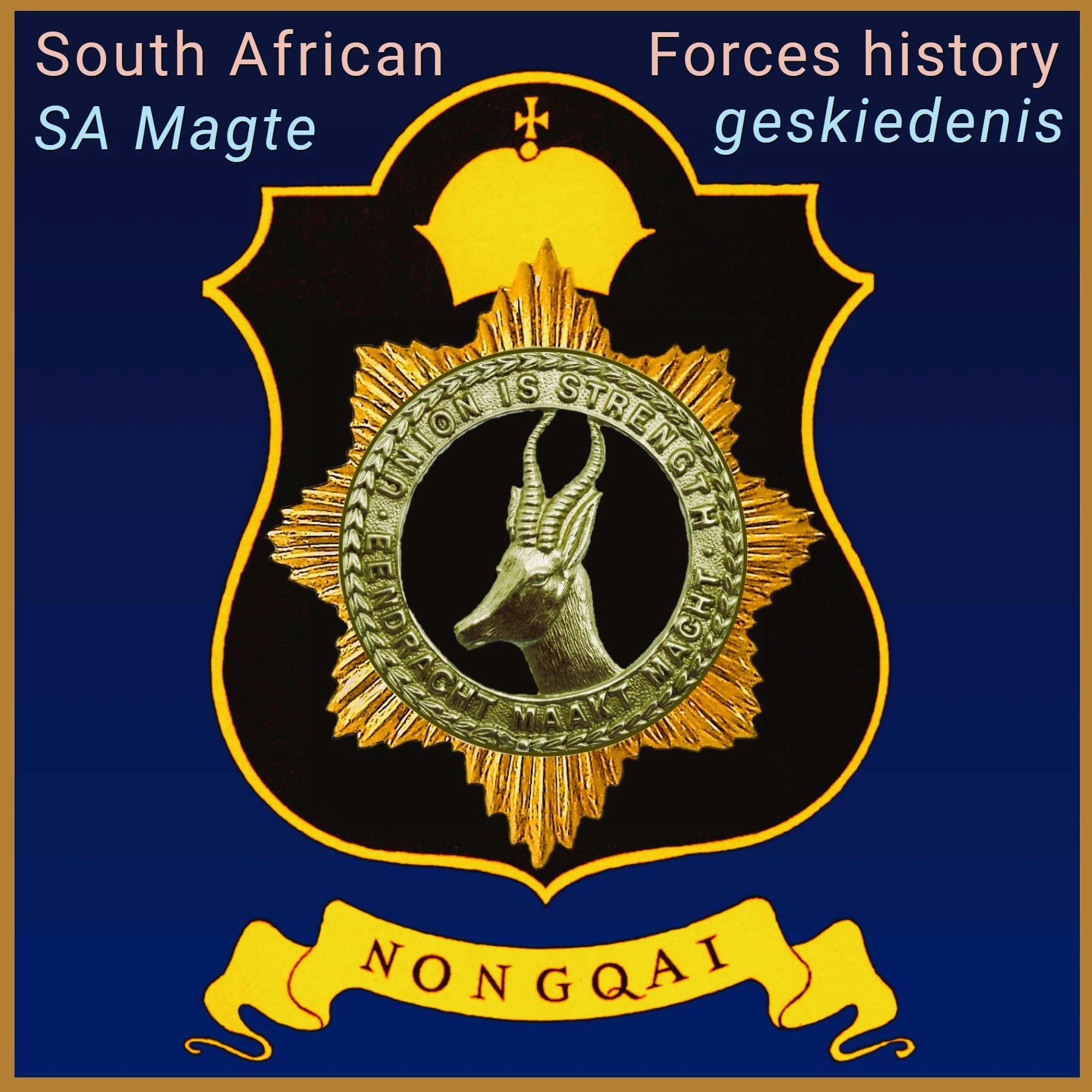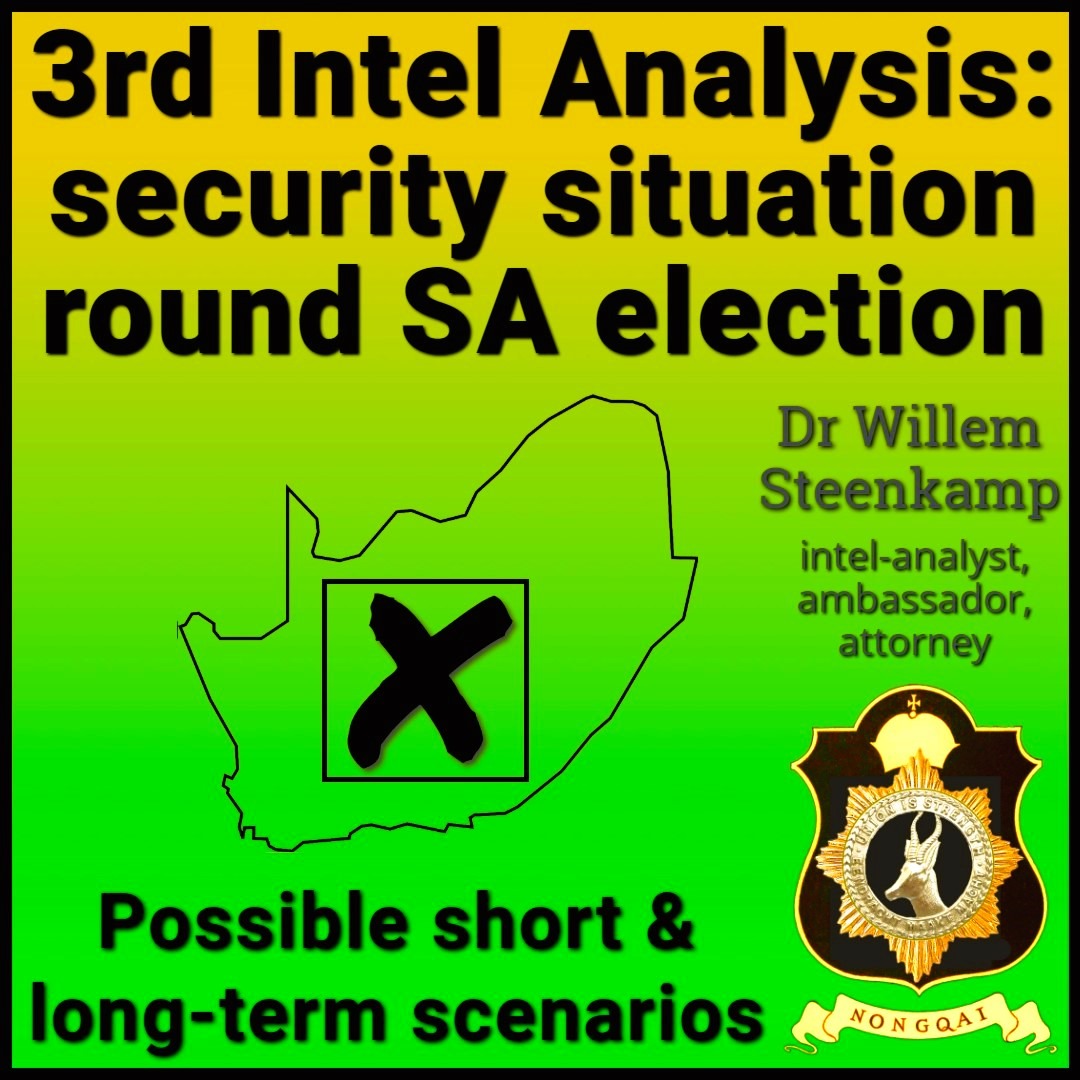ABSTRACT: NONGQAI’s Third Analysis of Security Concerns round the 2024 South African Elections is focused on understanding the tactics that underpin this election’s main news: the Zuma-aligned MK party versus the ANC Tripartite Alliance. We assess the security situation likely to pertain just prior to, during, and especially in the aftermath of the 2024 South African general elections and find that there is reason for guarded optimism about avoiding widespread short-term unrest – principally because government institutions (as well as business and civil society) are alert and prepared. There is, however, much uncertainty about the election’s outcome and thus concern about the possible long-term implications for the security of basic rights that could flow from a (seemingly likely) coalition government, if such should be formed around a radical policy platform aimed at replacing the existing constitutional and economic model. Should this transpire, it could seriously impact both the short-term physical security situation and, more gravely, the long-term security of property rights as well as the nature of the constitution, plus the rule of law – which would, in turn, affect investor confidence and emigration, and thus the future economic prospects and stability of the nation.
FOCUS KEYWORD: THIRD ANALYSIS OF SECURITY CONCERNS ROUND THE 2024 SOUTH AFRICAN ELECTIONS – SHORT TERM AND LONG-TERM SCENARIOS
KEYWORDS: South African general election 2024, Cyril Ramaphosa, Jacob Zuma, MK Party, ANC, EFF, property rights, supremacy of the constitution.
AUTHOR: Dr Willem Steenkamp (retired intelligence analyst, ambassador, lawyer, co-editor Nongqai SA Forces History Magazine).
THIRD ANALYSIS OF SECURITY CONCERNS ROUND THE 2024 SOUTH AFRICAN ELECTIONS – SHORT TERM AND LONG-TERM SCENARIOS
1. THE FOCUS OF THIS ANALYSIS
In the first analysis in this series, we looked at the historical background relevant to the possible security challenges that may arise around the 29 May 2024 South African general elections. This served to provide context and explain why – on the principle of rather being safe than sorry – communities and families needed to make prudent contingency plans (without however falling prey to paranoia). That article can be read with this link: https://nongqai-bpfkfybrbtd7bacm.southafricanorth-01.azurewebsites.net/intel-analysis-security-situation-round-sa-elections/
The second analysis explained why unrest of the kind seen in July 2021 seems unlikely in the run-up to the elections (principally because all concerned are, this time, alert and prepared). Thus far, our prediction that things are likely to remain calm prior to the election has indeed been born out in practice. However, we had also highlighted some of the allegations circulating in private intelligence circles about political plans afoot to unseat the current leaders of government in parliament, should the election result necessitate the formation of a coalition government.
Should no party gain an outright majority and these planned tactics indeed be employed, then it may affect public order during such a post-election coalition-building phase, because of the likelihood of emotionally-charged jockeying for position during such horse-trading – especially in a province such as KZN. That analysis and the information it provides about the so-called “Melrose Plan” can be read via this link: https://nongqai-bpfkfybrbtd7bacm.southafricanorth-01.azurewebsites.net/intel-analysis-2-security-situation-round-sa-elections/
In this 3rd analysis of the likely security implications of the upcoming South African general election (to be held on 29 May 2024), we will look at two types of security implications, assessed over two time frames. We will also look at the tactics and goals driving this election’s main story – the rivalry between the Zuma-aligned MK Party and the Ramaphosa-led ANC Tripartite Alliance, to help you comprehend what is really going on (it’s essentially an intra-ANC “family fight” for the heart and soul of the broader movement, which will determine who controls it).
The first kind of security concern will be the potential for threats to the physical security of persons and assets which may arise over the short term, meaning during the elections and their immediate aftermath (i.e., is looting and unrest similar to that which occurred in July 202, likely?).
The second set of potential security threats are of a more systemic and long-term nature but could turn out to be much more profound in their impact than the short-term ones related to immediate unrest. This is so because threats to fundamental rights can have destructive consequences far beyond the random destruction caused amidst the mayhem of emotion-driven unrest, which latter typically flares up but then fizzles out relatively quickly.
These long-term threats to the political system will result if radical policies are adopted by a new government (possibly a coalition) that may emerge from the elections. These may be policies which, over time, could seriously affect such a government’s ability to meet and manage basic societal aspirations and fears. In essence, it depends on whether such new policies will strengthen, or further weaken, the ability of the national economy to fulfil the basic needs of a rapidly growing, already severely impoverished and frustrated population.
Key to the economy’s ability to deliver will be investor confidence, plus retaining skilled labour and entrepreneurs – which all may be gravely impacted by policy choices that a new governing coalition may make. It will be necessary to avoid further polarisation, emigration, and capital flight. This will inter alia depend on guaranteeing the continued supremacy of a constitution, the protection of property rights, and ensuring community security against crime.
2. THE RESULTS OF THE ELECTIONS WILL DETERMINE LIKELY SCENARIOS
Both the short-term and the more fundamental, enduring security considerations depend very much on the results that the main political groupings will achieve at the ballot box. It is, therefore, necessary to clarify at the outset those likely scenarios and their respective implications, so that one can then apply that understanding when assessing what may result, security-wise, over the short and longer terms.
If the opinion polls are to be believed, then out of the many dozens of registered political parties only four have significant (10%+) national support – being the ANC, DA, MKP and EFF. This does not mean that some of the other parties of a more regional or group character will not be significant (especially locally) in their regions of strength – parties such as the PA, Good, FF+, IFP, and the like. However, as far as relevance to potential threats to security are concerned, the four main parties – and especially the ANC and MKP – are going to be key.
Therefore, it is important to understand their background and goals, in order to understand what may unfold.
2.1 THE NATURE OF THE ANC AND MKP, WHICH ARE NOT TYPICAL WESTERN-STYLE POLITICAL PARTIES
The first thing to state about both the ANC and MKP, is that they are not your typical political parties such as those usually encountered in the Anglophone world. The Ramaphosa-led ANC Tripartite Alliance is not and has never been a monolithic hegemon – it is a “big tent” movement consisting of factions working together to gain and maintain power.
The MKP, for its part, is not a typical opposition party either – it is a faction within that broader ANC family which has resorted to forming a political party as a tactical expedient only, in order to weaken the current leadership and replace them (which is why Mr Zuma adamantly remains a registered ANC member, proclaiming his crusade to be about restoring to the ANC its liberation struggle purity of purpose and policy).
2.2 PROPORTIONAL REPRESENTATION HAS A DIFFERENT DYNAMIC TO ANGLOPHONE SYSTEMS
Furthermore, the proportional system of representation which now applies in South Africa is not at all akin to the two-party systems typically found in the Anglophone world, with the latter’s “first past the post”, constituency-based electoral model.
This constitutional reality seems likely to feature strongly in determining the configuration of the government to be elected on 29 May 2024, which may for the first time be a coalition. This is true, despite it having been common to keep on thinking of South Africa’s political dispensation in terms of the two-party Anglo paradigm which we had become familiar with before 1994 (during the past three decades, this continued to apply in the public mind essentially because a united ANC had up to now been guaranteed an absolute majority, which understandably fostered a continuation of the historic perception of a model based on a monolithic, majority governing party versus a main opposition party).
2.3 THIS ELECTION REVOLVES AROUND AN INTRA-ANC FAMILY TIFF
Fundamental to understanding the key political power struggle that we are seeing playing out in this election is to comprehend that, as regards the ANC and MKP, it is all about two things. Firstly, that the ANC has always been a broad and somewhat diverse political “family” consisting of allied yet distinct member groupings, rather than being a monolithic, strongly hierarchical and unified party. What has held these factions together is their understanding that their unity is mathematically essential to gaining and maintaining control over the levers of state power.
Today the ANC, more than ever before, is engaged in an intense, factional “intra-family” struggle for control. However, instead of fighting it out inside the ANC at its electoral conferences as before, a new tactic has now emerged – thanks to comprehending the workings and potential of our system of proportional representation.
Inside this “family tiff”, the electoral tussle between the MKP faction and the Ramaphosa-led ANC revolves tactically around whether the former can bring the Ramaphosa-led ANC to below 45% of the popular vote (so that the ANC can’t construct a governing coalition with the small parties such as Good and the PA).
2.4 THE MKP’s TACTICAL PLANNING
The Zuma faction are consummate political tacticians (as they demonstrated at the Polokwane elective conference when they exploited a gap in the ANC’s internal constitution to flood that conference with delegates from a multitude of newly formed ANC branches across the Zulu heartland). Now they have spotted and are exploiting the gap that the national constitution provides them – through the proportional system – to try and bring the Ramaphosa-led ANC to below 50% and ideally (for them) below 45%.
Whereas the Zuma faction would need to muster more than 50% at an ANC elective conference to unseat Mr Ramaphosa in such a forum, in the parliamentary context they now simply need to take away enough votes from the Ramaphosa-led ANC to make the latter dependent upon the MKP for enjoying again the fruits associated with being in government.
You can test the veracity of this assessment with your own logic – if the Zuma faction had not adopted this tactic and registered the MKP, we would likely not now be talking about the possibility of a coalition government, because the “broader ANC family” with the Zuma supporters inside the tent, would most likely have been heading now again to an outright majority.
If the MKP can force the Ramaphosa-led ANC below +-45%, then the Zuma faction will be able to make a case to the broader “ANC family” to re-unite in order to be able to enjoy the fruits of governing – at the price of ditching Mr Ramaphosa, with the tail then effectively wagging the proverbial dog…
It should be remembered that close to half of the “representative ANC” (meaning, the leadership element present at its elective conferences and constituting the bulk of its list of members of the national assembly) have in fact been supportive of Mr Zuma, with Mr Ramaphosa only winning within the ANC by the skin of his teeth. The Zuma faction therefore reckons that they will be able to count on a strong “silent Zuma supporter” element within the ANC’s caucus (the elections in parliament for the positions of speaker ad president, are by secret ballot).
The Zuma objective will be to rub in that it was under Mr Ramaphosa’s leadership that the ANC dipped below 50% (if that indeed proves true at the ballot box on 29 May). If they can bring the ANC below 45% in the elections, then internal cohesion within the ANC caucus will likely be put under considerable strain. Depending on the exact final figures, it is not inconceivable that the Zuma faction may find a majority favourable to re-uniting in order to be able to govern and enjoy the spoils associated therewith, even if the price is Mr Ramaphosa’s head…
The foregoing explains why Mr Zuma has been absolutely insistent upon the fact that he still is, and wishes to remain, a registered member of the ANC. The fact that the MKP chose the name and symbolism of the ANC’s former armed wing clearly points to the Zuma faction positioning themselves as being at heart still ANC – in fact, as the “true, pure” hard core of the liberation movement – intent upon rescuing the ANC from the “white monopoly capital puppet” who had managed to take over at its helm. They insist that the formation of the MKP was, therefore, a temporary yet necessary expedient in order to achieve an electoral outcome that would demonstrate the need for the “ANC family” to unite and return to its roots.
The MKP is, therefore, in its conception very different from the earlier breakaway parties (most notably COPE and the EFF) which were set up as out-and-out opposition to the ANC, and whose lack of significant impact since has demonstrated that it is “very cold outside the ANC tent”.
All of this serves not to suggest that the intra-family ANC tiff we are now witnessing is solely driven by personal ambitions and egotistical thirst for power and its perks. The ANC had always been marked by the existence of different factions within it, such as the Africanist faction with their vision of Africa for the Africans (ruled in African style), the communists, the non-racialists, and the RET radical economic transformers who seek economic redress by means of re-distribution of land and nationalisation of capital and assets (philosophical and ideological divisions which in the past found expression in the ANC’s “London” and “Lusaka” wings of the eighties, for example).
Fact is that the ANC has always tried to accommodate these factions within a “big tent”, from the “Congress Alliance” days of the fifties to the modern-day “tripartite alliance” consisting of the ANC, the COSATU trade unionists, and the SA Communist Party, which together had contested every election since 1994 as formal alliance under the ANC banner.
Given this ANC tradition of accommodating factions it is thus not far-fetched on the part of the Zuma faction to hope that they can tactically use the proportional representation dispensation to emerge again – within a re-united broad ANC family – as kingmakers when and if they can demonstrate that they, statistically, hold the key to the Union Buildings…
Mathematically speaking, it is evident that the “broader ANC family” had not really lost significant voter support over the decades – they had in fact lost were “family members” and their associated voters, such as the anti-Zuma COPE supporters after Polokwane, the ANC Youth league “Young Lions” under Malema and Shivambu who formed the EFF, and now the Zuma faction under their “we are the true heirs and custodians of the Africanist/RET revolution” MKP banner.
Should these former “family members” re-unite, then one will likely find (when adding up the votes to be garnered in 2024 by these factions and adding it to the Ramaphosa-led ANC’s likely total), that it brings one back to roughly the percentage of popular support that the ANC had enjoyed under Mr Mandela. Which is borne out by the reality that the other political parties such as the DA, the IFP and the FF+ have not been able to syphon off significant numbers of former ANC voters to themselves – in other words, they have not grown at the ANC’s expense.
Understanding the main goals of the Zuma faction, namely to bring the Ramaphosa-led ANC to below 45% and then to replace Mr Ramphosa and his key supporters at the head of a “purified” and re-united ANC family, will enable us to now assess the likely tactics to be employed to these ends, and consequently to appreciate the possible security implications there-of, over the short a well as longer term.
3. THE SHORT-TERM CONSIDERATIONS AROUND PHYSICAL SECURITY
When analysing the short-term potential for unrest around the 2024 South African general election, five distinct phases need to be looked at:
- The pre-election phase;
- Election day itself and the vote-counting phase;
- The announcement of results and how these are received;
- The coalition-building phase, if the results did not bring forth a clear winner; and
- The initial parliamentary phase of swearing in and constituting the national assembly, electing a speaker and voting for the president.
3.1 THE LAST DAYS BEFORE THE ELECTION
The pre-election phase will likely continue to run its course in relative calm (apart from possible local flare-ups instigated by things such as assassinations and other inflammatory shenanigans like removing opposition posters). This is, firstly, because it is not in the political interest of any grouping to be seen at this stage as instigators of violent mayhem of the kind that reigned for a few days in July of 2021. Secondly (and very importantly), because it is evident that the government, its security forces, as well as local communities and the private sector are very much on the alert and prepared this time round.
The major leverage that the Zuma faction had wished to exploit ahead of the election had been public frustration and discontent with service delivery, particularly electricity supply. However, as has been evident over the last couple of months, the government (with significant input from the private sector) has been able to dismantle key components of the strategy that had been followed to debilitate ESKOM, so that un-interrupted power supply has (for now at least) become the norm again.
3.2 ELECTION DAY AND THE SUBSEQUENT VOTE-COUNTING
Election day itself is also likely to pass without nationwide disturbances being purposely instigated on the part of political leaders, although localised issues may inflame emotions and cause unrest in isolated localities.
What may occur, though, is that the criminal element may try and exploit the somewhat febrile atmosphere for their own ends, trying to camouflage things like truck hijackings by inviting concurrent looting (as has already happened in these final days before the election).
Because of the absolute tactical need for the MKP (and EFF) to ensure that the ANC falls below 45% of the vote, an important pointer regarding things to come will be whether Mr Zuma will step up his allegations about electoral fraud. If the volume and intensity of such allegations should start picking up as election day and te counting unfolds, it will likely indicate concern on Zuma’s part that they may not be achieving their goal of keeping the Ramaphosa-led ANC below 45%.
Things will start entering the critical phase as the vote tallies are being tabulated by the IEC. Any tardiness or semblance of manipulation during those days of suspense will be seized upon, especially if the MKP starts seeing evidence that their goal will not be achieved. This is when the temptation may begin to be felt to try and use mass mobilisation / rolling mass action as lever to try and force a result favourable to them (undertaken in the best tradition of democratic engagement, of course…).
3.3 OFFICIAL DECLARATION OF THE RESULTS AND POSSIBLE SCENARIOS RESULTING FROM THAT
The pivotal moment will be the declaration of the results. On this will hinge how the distinct scenarios that one can envisage and their associated consequences, may in fact roll out – both in terms of the composition of the future government, and the reaction of parties such as the MKP and their supporters.
4. LIKELY SCENARIOS, DEPENDING ON THE RESULTS
4.1 FIRST SCENARIO – ANC MAJORITY OF OVER 50%
The first possible scenario is again an overall majority for the Ramaphosa-led ANC. Even though opinion polls currently seem to indicate that the ANC will likely not achieve 50% +1, it cannot be ruled out as possibility because of three things: the ANC’s proven past ability to mobilise significant support in the final stretch, the advantages of incumbency that it enjoys, and the fact that a substantial proportion of voters surveyed in the polls had not yet made up their minds.
Should the ANC garner more than 50% of the vote, then government will in all probability continue much as before, and the long-term risks foreshadowed above, will be mitigated. Over the short term, once empowered and legitimised anew by an overall majority, the government will also be in a strong position to have its security forces deal with any possible unrest that losers may try and instigate with allegations of electoral fraud.
4.2 SECOND SCENARIO – ANC BETWEEN 45% AND 50%
The 2nd possible scenario is that the ANC Tripartite Alliance fails to gain 50%, but nevertheless do achieve a score (probably needing to be above 45%) that’s sufficient to allow it to form a coalition government with smaller parties such as Good and the PA. In this case government will also probably continue much as before, with the same observations regarding short and long-term security as already mentioned regarding scenario one, being again applicable.
4.3 THIRD SCENARIO – ANC BELOW 45%
The third scenario arises when the ANC fails to achieve a score that will enable it to form a governing coalition with the aid of the small parties (probably transpiring if it should fall below 45%). In that case, the Ramaphosa-led ANC Tripartite Alliance will need to enter into a coalition with at least one of the other three significant parties.
It needs to be stated here that the opinion polls make it quite clear that the DA’s “moonshot coalition” (the MPC) will not on its own come anywhere near 50% by itself. The MPC parties combined will probably garner around a third of the popular vote, nationally. What is also clear is that the important trade union component of the ANC’s Tripartite Alliance does not favour the ANC going into a coalition with the DA. Another consideration is that the DA is “too big” to be an ideal coalition partner for the ANC (meaning they may insist on holding too much sway and positions, based on likely having more than half the seats that the ANC holds).
Which will leave the ANC with no other option but to seek a coalition with either the EFF or the MKP, or both. Which can also include other smaller parties, with the objective of possibly constituting a two-thirds majority in the National Assembly.
4.3.1 THE “BIG REVEAL” TO SIDELINE THE RAMAPHOSA LEADERSHIP
It is alleged that the Zuma faction’s tactic for sidelining Mr Ramaphosa and his supporters once parliament reconvenes, will be to threaten to bring forth damning “reveals” about corruption regarding Phala-Phala and similar incidences of alleged wrong-doing on the part of key figures in the Ramaphosa camp. This seems inter alia to be based on the ANC’s internal policy of members having to step aside when credible proof of alleged corruption is presented.
What the Zuma faction above all wants, is for Mr Ramaphosa to be sidelined. What the EFF wants, is control over the finance and economic affairs policy platform of such a coalition. The moderate elements in the ANC may be more inclined to welcome back the MKP than the EFF. After all, there are senior ANC members like minister Lindiwe Sisulu, for example, who probably are ideologically far closer to the Zuma faction’s viewpoints than to those held by the Ramaphosa supporters – the “silent Zuma supporters” who almost had won during the ANC’s interbnal electoral conferences.
4.3.2 INTERNAL UNITY WITHIN THE PARLIAMENTARY ANC MAY COME UNDER SEVERE STRAIN
However, one cannot simply assume that the entire ANC will be willing to jump into bed with either the MKP or EFF, merely to be able to enjoy again the fruits of being in power. As had for instance happened with COPE, a certain percentage of the ANC may indeed refuse to be part of a coalition with either the MKP or the EFF. They, in turn, may start threatening to break away. Which may then mean that the number of seats scored by the ANC in the election, cannot simply be assumed to be available unaltered for the purpose of passing the 50% mark with the aid of the seats won by either the MKP or EFF.
This could create real uncertainty and powerful tensions during the two weeks allowed by the constitution for a governing coalition to be put together…
The intense, high stakes horse-trading that is certain to result if the ANC had scored too low to be able to assemble a coalition with only the small parties, would create the most fertile soil for mass action to be resorted to as leverage by political players. In short: whereas election day as such does not seem to present a strong threat of disruption, the coalition-building phase may indeed see emotions rise and mass public posturing being resorted to, if the ANC falls to below 45%.
If matters aren’t sorted out by the time that parliament convenes for the national assembly to be constituted and the speaker and president to be elected through rounds of secret ballots (with the least favoured candidate each time falling by the wayside), and if the MKP indeed then attempts to influence matters by means of a “big reveal” designed to effectively disqualify the Ramaphosa-related leadership they want to see ousted, then the situation may become very intense and unpredictable – both inside the chamber and outside, in the public realm.
It should not be forgotten, either, that this scenario may well also play out at the provincial level, with KZN being the most factionally riven. This can overheat emotions, leading to public order coming locally under threat. Which again may present a target of opportunity for the criminal element.
5. SYSTEMIC, LONG-TERM THREAT TO THE SECURITY OF BASIC RIGHTS
It is probably obvious to any informed reader that, if the ANC needs to enter into a coalition with either the EFF or the MKP (or both) in order to be able to govern, then the price that these kingmakers will be able to exact in terms of policy, will be very high. It is then that the long-term threat to the fundamental security of the rights held dear by large part of the productive populace will seriously manifest. Those rights which determine investor confidence and thus economic production. Fundamental rights which depend essentially on safeguarding the supremacy of the current constitution, with the courts as it guardian, and on respecting property rights.
The long-term implications of such a coalition wagged by a radical tail coming to power, will be more grave for the future sustainability of South African society than even a repeat of the July 2021 unrest could ever be…
Those MPs elected to the new assembly, and the party leaderships behind them, may very well have to make vitally important choices, having to choose among limited and not ideal options, and having to do so within a very limited timeframe of just two weeks. It seems important that their choices should above all be realistic and driven by the national interest, rather than by personal or party-political interests.
6. COALITIONS ARE COMMON IN SYSTEMS OF PROPORTIONAL REPRESENTATION
The reasoning of parties and their elected representatives should also be based on a clear understanding of the true characteristics of a system of proportional representation (as in practice now emerging for the first time in South Africa) and not on outdated assumptions associated still with the Westminster model of yesteryear. For examples they need to look at other countries using proportional representation, and not at the Anglophone world.
It is a fallacy to argue that, by going into a coalition in a proportional system, you are “contaminating” your party as co-responsible for the lead party’s errors. That may well apply in a typical Anglo two-party system (as the Liberal Democrats found out to their cost in Britain, a decade ago).
On the contrary – in a proportional system you go into government in order to take hold of the handbrake and to stop the steering wheel from spinning out of control. You are there for the sake of the group that had elected you, to efficiently represent and hopefully protect their interests as a group (increasingly, parties based on group, sectoral or regional interests emerge as the key building blocks in such proportional systems).
Remember the National Party example – they had made the fundamental error of leaving the then government of national unity, precisely based on the fallacious assumption that they will otherwise by struck by joint blame for the Mandela-led government’s policies. All they achieved was total irrelevance, leading to that once mighty party being quickly thereafter disbanded… And, the NP leaving had certainly not resulted in them being able to induce better government from the opposition benches!
7. GETTING AT LEAST SOME HOLD ON THE STEERING WHEEL (AND THE BRAKE)
Politics is about the exercise of power, not about virtue-signalling from the sidelines.
To influence the exercise of power, you have to be in the steering cabin, hands-on. Shouting and posturing from afar is less than useless. The coming election may well present the opportunity for other parties than uniquely the ANC, to have some say in how political power will be wielded. Not only to influence what will be done, and how (in terms of which policies will be actively pursued). Even more important in a proportional representation system, is the ability to influence what policies should be rejected, in order to avoid disastrous choices or changes in direction being made.
It is a simple fact that the average politician is most strongly motivated by the opportunity to govern, more than by puristic ideological positioning. This applies also to the bulk of the parliamentary ANC. Like it or not, for this election they will still hold the balance of power within our political system – even should they perhaps not achieve an outright majority. In that case, it is going to be crucial to approach coalition-building from the perspective of helping to ward off disaster, rather than being self-indulgently bound by egotistical policy puritanism or prior pledges to unrealistic alliance partnerships that anyway had no real chance of achieving a majority.
8. HISTORY SHOWS HOW BADLY THINGS CAN GO WRONG WITH MISGUIDED POLICIES
The Zondo Commission has extensively documented what had occurred when Mr Zuma had his hands on the levers of power in years past. His faction’s goal of subsuming the courts to the will of parliament in the name of “Africanising” the system will gravely threaten democracy, the rule of law, good governance, and investor confidence. In addition, the world has seen (in places such as Venezuela and Cuba and many an erstwhile “people’s republic” in Africa), to what economic devastation the policies favoured by the EFF and the “Radical Economic Transformation” (RET) faction typically leads.
A governing coalition where this kind of tail wags the dog, should not be permitted to arise by default – as it surely will, if parties with the requisite expertise and experience to make a positive contribution to the way we are governed, prefer to shout from the sidelines rather than to get hold (however partial) of the steering wheel and the handbrake…
From an intelligence analysis perspective, therefore, the gravest security threat arising in association with this election is likely not to be of uncontrolled short-term unrest such as a repeat of the July 2021 mayhem. The existential threat lies in a coalition with destructive policies coming to power (if no party gains an outright majority). Because believe me – things can indeed get far worse than they already are, if that scenario should transpire…
9. WHAT WILL LIKELY HAPPEN?
With this election, South Africans are entering new territory. Consequently, the result remains highly unpredictable, even this close to the election. Anything remains possible, at this stage. Polling is difficult in a country as large and diverse as South Africa.
We believe that it remains important to avoid paranoia but nevertheless to be prepared for any eventuality, because it is realistic to assume that any of the scenarios mentioned above can indeed happen – there is simply no reliable data or precedent to go on. None can be excluded now. The ANC can quite possibly garner above 50%. They have the benefit of incumbency, and it would be naïve to imagine them incapable of pulling a rabbit out of the hat, by hook or by crook (governing parties rarely lose elections in Africa – just as opposition parties equally rarely refrain from yelling fraud).
On the other hand, it is also possible that the ANC’s vote may prove to have collapsed, with some even suggesting it falling to 40% or below…
Many informed observers, however, seem to sense that the ANC will likely get between 45% and 50%, with 48% or 49% being most frequently punted. In many ways this may be viewed as an ideal outcome, in terms of the scenarios discussed above. It may well be wishful thinking, because such a scenario will avert the need for a coalition with either the MKP or EFF and will allow sensible voices (even if from small parties) to be heard around the cabinet table.
The question is – will these parties recognise the imperative to participate?
Should the worst happen at the ballot box for the Ramaphosa-led ANC Tripartite Alliance and some kind of coalition between it and either the EFF or MKP (or both) become unavoidable, then it must be hoped that such a radical coalition government does not achieve the possibility to muster two-thirds of the seats in parliament, enabling it to override the constitutional protections. Then, also, civil society and the private sector will need to exert maximum influence to try and ensure that radical policies are not wantonly implemented.
Again, it is important not to descend into paranoia – there are indeed many counterweights that could help ensure that the radical rhetoric typical of any campaign trail doesn’t lead to self-harming policies in practice.
It should also be admitted that the current constitution as such, was a compromise made under severe time pressure during an era immediately after the Cold War when everything Western seemed superior – what experience has taught us since, is that the current Westminster-style constitution can indeed benefit from being tweaked to make it more apt for African reality (as well as better attuned to a system of proportional representation), without however throwing the baby out with the bathwater, as regards key rights and principles such as the rule of law.
10. FINALLY, DON’T FORGET ABOUT THE PROVINCES
All that has been said and warned above regarding national politics (should no clear majority be achieved by any party), may play out even more intensely in highly contested provinces such as KZN in particular, Gauteng, and the Western Cape. This can give rise to severe pressure, locally, on the maintenance of public order amidst the horse-trading and jockeying for position at provincial level during the coalition-building phase. What needs to be avoided, above all, is further polarisation.
Given the reality that, with this election, its aftermath may be a more worrisome period than the run-up to it, we will continue assessing and publishing this kind of analysis till full clarity and stability has again come about. So, if you want to be notified by WhatsApp when the next article becomes available, please fill in the short form at the bottom of this blog post. Thank you for your attention, and please consider making a donation (of a size entirely of your choice), to help us cover the costs of bringing you Nongqai’s informative articles.
Bly ingelig, en bly veilig!










